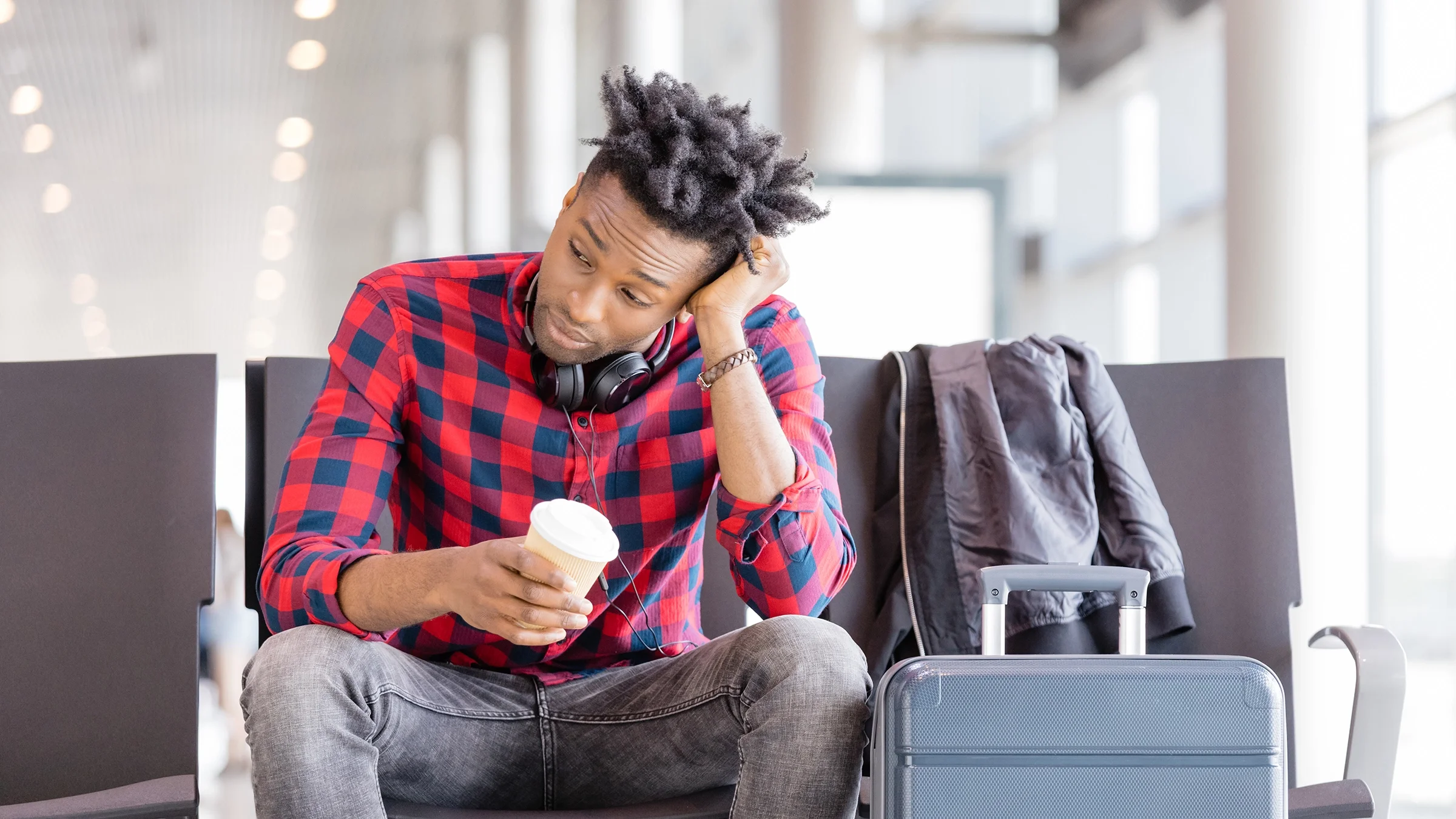Key takeaways:
Jet lag occurs when your internal clock becomes out of sync after you travel quickly across multiple time zones.
Symptoms generally begin one or two days after travel, and they tend to worsen the farther you go across time zones and with trips going eastbound.
Luckily, there are steps you can take before, during, and after your trip — like getting sunlight exposure at the proper time — to help your biological clock recover faster.
It’s finally time for that long overdue vacation. Your flight is confirmed. You’re excited about your upcoming trip and ready to unplug. But what if jet lag ruins your travel plans?
While avoiding jet lag is difficult, there are ways to minimize its effects and recover quickly.
What is jet lag?
Jet lag is a short-lasting sleep disorder that can occur after you travel quickly through multiple time zones. A time zone is the local time in an area. For example, the U.S. has four different time zones:
Eastern time
Central time
Mountain time
Pacific time
Search and compare options
Let’s say you’re flying from Miami and arrive in London at 8AM local time. After you land, you would hope to be functional with a full day ahead. But, because you traveled quickly through five time zones, you have not yet acclimated to the time in London. Your body continues to function in Miami’s schedule where it’s 3AM, which can make you feel ill.
Symptoms of jet lag
Common symptoms of jet lag include:
Daytime fatigue
Problems sleeping at night and waking up in the morning
Poor concentration
Memory problems
Inability to function physically and mentally
Anxiety
Headache
Irritability
Upset stomach, including constipation and decreased appetite
Some people experience only a few symptoms, while others may develop more symptoms that can be debilitating. Some people are rarely affected by jet lag, while others may take a long time to recover.
How soon after traveling do symptoms of jet lag begin?
Symptoms of jet lag usually begin 1 to 2 days after traveling. For many people, symptoms typically start on the second day.
It takes approximately one day to recover for each time zone you cross. So it would likely take 5 days to recover from the flight from Miami to London because you crossed five time zones. As your body shifts to the new schedule, your symptoms diminish until they resolve completely.
Read more like this
Explore these related articles, suggested for readers like you.
What causes jet lag?
Jet lag happens when your body’s regular sleep-wake pattern becomes disrupted after a long flight. The human body has a biological clock, called the circadian rhythm, that allows it to function on a 24-hour cycle. It tells you to be awake during the day and asleep at night.
Your circadian clock is regulated by the pineal gland — a small gland located in the brain — that secretes the sleep hormone melatonin. To help you fall asleep at night, the pineal gland produces high levels of melatonin. During the day, it makes very little melatonin.
Signals from the environment such as light, temperature, and your daily routine also help balance your circadian rhythm. This pattern repeats every 24 hours and is synchronized with the time zone where you live.
When you go on a long trip — like the one from Miami to London — that involves flying across three or more time zones, your circadian clock becomes desynchronized. It eventually adapts to the new time, but this can take days or even weeks.
What are the risk factors for jet lag?
Some factors that can affect your risk of experiencing jet lag include:
Number of time zones traveled: The more time zones you cross, the longer your internal clock takes to adjust.
Direction traveled: Jet lag tends to be worse when traveling east. This happens because when flying eastbound (from Miami to London, for example), you lose 5 hours and have to advance your internal clock to catch up to London time. But on your return trip, you travel westward, which means you’re delaying your internal clock. It’s been found that pushing back your biological clock is easier than advancing it.
Being an older adult: The American Academy of Sleep Medicine (AASM) reports that older people may experience more jet lag symptoms and take longer to recover.
Jet lag may also be affected by other factors like dehydration due to dry air on the plane and low oxygen levels in the air cabin.
What can you do to reduce the effects of jet lag when you travel?
The good news is that there are steps you can take before traveling and during the flight to reduce the effects of jet lag.
Before travel
Budget your time. Plan to arrive at your destination a day or two before any important activity. This will give your circadian rhythm time to adjust to the new schedule. If arriving early is not possible, try to avoid overscheduling your first few days.
Train your internal clock. Since it takes time to adapt to the new time zone, get a head start. You can do this by gradually changing your sleep pattern before you travel. Starting a few days before your trip from Miami to London — since you’re traveling eastward — you may want to go to bed one or two hours earlier than usual to train and pre-adjust your circadian rhythm. To minimize the effects of jet lag before your return flight, do the opposite by going to bed 1 or 2 hours later a few days before.
Take off well rested. In addition to slowly adjusting your sleep pattern, try to get plenty of sleep and good rest in the days before your departure.
Eat well. Before your flight, consume small and light meals to help reduce the risk of stomach upset.
During your flight
Drink wisely. Stay well hydrated with plenty of water. Alcohol and caffeine can cause dehydration and sleep disruption, so limiting these substances before your flight and while onboard is a good idea.
Set your clock. While on the plane, follow your destination’s sleep-wake schedule. On your flight from Miami to London, you may have left Miami in the evening, but it’s already night time in London. Try to sleep or rest on the plane to get your internal clock in sync.
Move around. While awake during your flight, get up to walk, and stretch your legs when you can. This will also help reduce your risk of getting blood clots.
Choose healthy meals. Reach for nutritious snacks and light meals while onboard to minimize stomach upset.
Boost your sleep. Some studies have shown that taking melatonin may help with jet lag, but other studies have not shown any benefit. Talk to your healthcare provider about taking melatonin or a sleep aid while away.
What are the fastest ways to recover from jet lag after traveling?
The most important factor in managing jet lag's effects is resetting your circadian clock to match the new time zone of your destination. Here are some tips to help you achieve this faster:
1. Go out, and get some light
Sunlight plays a significant role in synchronizing your internal clock. It helps dictate to your pineal gland when to release melatonin. Exposing yourself to daylight at the appropriate time and exercising can help you adjust faster when you arrive.
The best time to get light exposure depends on the direction you traveled and how many time zones you crossed. On arrival in London from Miami, the best time to get sunlight would be between midday and late afternoon. There is no evidence that artificial light sources are beneficial in reducing the symptoms of jet lag.
2. Be caffeine smart
Use caffeine carefully to help you stay awake during the day, but avoid it in the evening. Remember that some tea, energy drinks, soda, and chocolate contain caffeine.
3. Quench your thirst
Choose water whenever possible to keep you hydrated and combat the effects of jet lag.
4. Consider a nap
If you’re tired and sleepy, a short 15- to 20-minute nap may help you feel refreshed.
The bottom line
If you travel quickly through multiple time zones, you will likely experience jet lag. But its symptoms don’t have to ruin your travel plans. Typically, your internal clock self-adapts to the local time a few days to weeks after arrival. However, tips like adjusting your sleep schedule before travel, staying well hydrated, and timing your daylight exposure may help you ease into the new time zone faster and with fewer symptoms. Talk to your healthcare provider for guidance if you have an underlying sleep disorder or if your jet lag symptoms persist.

Why trust our experts?



References
American Academy of Sleep Medicine. (2008). Circadian rhythm sleep disorders.
American Sleep Association. (n.d.). Circadian rhythm and sleep.
Atkinson, G., et al. (2019). Jet lag. Centers for Disease Control and Prevention Yellow Book 2020: Health Information for International Travel.
Centers for Disease Control and Prevention. (2021). Jet lag.
Chan, V., et al. (2020). Efficacy of functional foods, beverages, and supplements claiming to alleviate air travel symptoms: Protocol for a systematic review. Journal of Medical Internet Research.
Eastman, C. I., et al. (2009). How to travel the world without jet lag. Sleep Medicine Clinics.
Halson, S. L., et al. (2019). Nutrition for travel: From jet lag to catering. International Journal of Sport Nutrition and Exercise Metabolism.
Herxheimer, A. (2014). Jet lag. British Medical Journal Clinical Evidence.
MedlinePlus. (2021). Jet lag prevention.
Muhm, J. M., et al. (2007). Effect of aircraft-cabin altitude on passenger discomfort. The New England Journal of Medicine.
National Center for Complementary and Integrative Health. (2022). Melatonin: What you need to know.
National Health Service. (2020). Jet lag.
Roach, G. D., et al. (2019). Interventions to minimize jet lag after westward and eastward flight. Frontiers in Physiology.
Sack, R. L., et al. (2007). Circadian rhythm sleep disorders: Part I, basic principles, shift work and jet lag disorders. An American Academy of Sleep Medicine review. Sleep.
Suni, E., et al. (2022). Jet lag and sleep. Sleep Foundation.

















